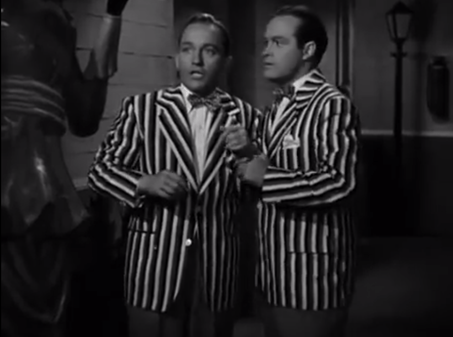
My dad has been and forever will be a fountain of pop cultural knowledge. I learned the little I know from the best, the difference is, he lived through most of it. Still, I must admit, at times I didn’t believe some of these touchstones of yesteryear when I was a kid. How could anyone have actually written a song called “Hello Muddah, Hello Faddah” and what in the world does “You’re in the Groove Jackson” mean? They can’s possibly be real.
Of course, for those more enlightened than I was back then, you would have already known that both these fantastical things were in fact true. Alan Sherman was quite the nut and the same goes for Bob Hope and Bing Crosby. In that roundabout way, we get to the Road Picture that I’ve always cherished at least a little bit because of one particular gag. But let’s start closer to the beginning.
The wonderful thing about the Road films is the very fact that their two bozos know exactly who they are and they never stray from those characterizations from one picture to the next, even if the schemes change as do their names. There’s the same self-referential jabbing and fourth-wall-breaking executed in a way that later films would pick up on too. People loved Hope and Crosby and they enjoyed their onscreen buddy-buddy just as much. By the looks of it, they always seemed to be having as much fun as the audience and that’s the key. It’s contagious comedy.
I’m inclined to think that some of the greatest comics are the ones who come up with the lines on the spot. But whether or not Hope and Crosby actually ad-libbed any of their verbal jabs, to their credit, they had a complete handle on their personas and so every phrase comes off as genuine.
They’re always trying to pull off some get-rich-quick scheme only to wind up in some wild locale completely broke. We’re always provided the enjoyment of Crosby’s ever-present condescending pet name “Junior” for his partner in crime. Because he takes on the mantle of the idea man and Hope unwittingly ends up doing the dirty work, in this case, a circus bicyclist up on a trapeze.
Crosby is also always playing the easily duped gentleman — a real sucker for the ladies — who’s not above throwing his pal to the lions except when it really counts. Plus you have to throw a little crooning in there to make all the ladies swoon a bit. We get an appearance by the All-American songstresses The Andrew Sisters performing “You Don’t Have to Know the Language” with Bing.
Still, everyone knows all that is “happening” in the world circa 1947 is in Rio so there the boys go as stowaways, of course, after getting chased out of town by an angry circus promoter. That’s what all the great comics do. Namely, The Marx Brothers, who were consequently also directed by Norman Z. McLeod in Monkey Business (1931) and Horse Feathers (1932).
Our two bunglers now aboard a slow boat to Brazil meet the ever-present Dorothy Lamour, the bodacious beauty in all their movies, as a grateful knockout, a damsel in distress. But something dastardly is going on as the gorgeous woman is caught in the hypnotic clutches of Gale Sondergaard who has a couple hired cronies (one played by a personal favorite Frank Faylen).
There are some real laugh riot moments not least among them watching the pals don their stuffiest British accents as they sway on the ship’s deck to snag an easy meal from a seasick patron or our heroes dressed to the tee doing their best impression of the samba. Of course, you have some tried and true favorites like “Patty Cake” or Hope’s sardonic one-liners such as affectionately calling his trumpet “Grable-bait.” Look it up if you don’t get it.
But the showstopper is the formation of their groovy band Americain made up of our hapless heroes and three Brazilian street musicians who earn a crash course in English. Composed of three universally accepted phrases: “You’re in the Groove Jackson,” “This is Murder,” and “You’re Telling Me.” Presto they’re Americans in a pinch and what follows is “Who’s on First” light.
The final charade is to break up an ill-fated marriage with a bit of safecracking and they bungle it immaculately. The greatest surprise of all is that Hope actually gets the girl (like Road to Utopia) except this time he gets a little help.
3.5/5 Stars
